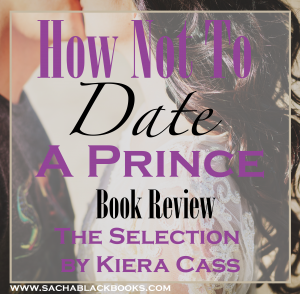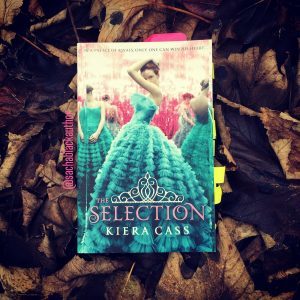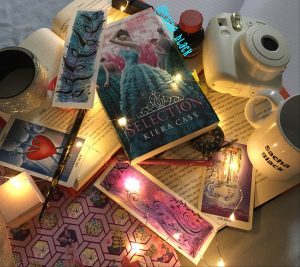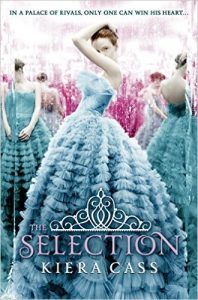How Not To Date A Prince – The Selection by Kiera Cass – A Book Review #tuesdaybookblog
 Here’s the thing, I swear I just read this book, I reviewed the Red Queen last week, and the similarities between books are striking.
Here’s the thing, I swear I just read this book, I reviewed the Red Queen last week, and the similarities between books are striking.
Nonetheless, here’s my review of The Selection by Keira Cass, YA dystopian romance book
Amazon Blurb
“Thirty-five beautiful girls. Thirty-five beautiful rivals…
It’s the chance of a lifetime and 17-year-old America Singer should feel lucky. She has been chosen for The Selection, a reality TV lottery in which the special few compete for gorgeous Prince Maxon’s love.
Swept up in a world of elaborate gowns, glittering jewels and decadent feasts, America is living a new and glamorous life. And the prince takes a special interest in her, much to the outrage of the others.
Rivalry within The Selection is fierce and not all of the girls are prepared to play by the rules. But what they don’t know is that America has a secret – one which could throw the whole competition… and change her life forever.”
You can buy the book from AmazonUK or AmazonCOM[image error]
Plot
It’s funny, but I read this book the same week I read The Red Queen, and I’ll be honest it had the opposite effect. Where The Red Queen made me fall in love with YA again, this did not.
The plot is crazy similar – poor girl (in caste system) gets made special and embroiled in rich boy’s world. The problem was, I felt like the plot was almost sexist. Misogynistic even, which surprised me because the author is female and the bulk of the YA audience is young females.
The concept of the selection itself is what bothers me. The Prince gets to date 35 girls and gets rid of them as he decides he doesn’t like them. Umm, what? A boy gets to date 35 women simultaneously, openly and then pick and choose between them. No. Just no. The worst bit is, the girls are all desperate for him. They want to be picked because it will change their lives because they’re mostly from lower castes. The thing is, even though the protagonist doesn’t want to be there and isn’t desperate for him, it doesn’t make up for it. Nor does it compensate for the insinuation one character gives to the protagonist that she should do ‘whatever the prince wants.’ Wink. Wink. Gross. Even though the prince finds the suggestion abhorrent I still cringed and not in the right way.
 The plot despite being incredibly similar to The Red Queen is painfully simple and at times slow. I expected the end of the book to give a conclusion to the selection, but there are two or three more books before that happens.
The plot despite being incredibly similar to The Red Queen is painfully simple and at times slow. I expected the end of the book to give a conclusion to the selection, but there are two or three more books before that happens.
My biggest bugbear, though, was that there was also no consequence for quite a significant rule break on Mer’s part. She got away with something that could have played out amazingly as a subplot. Perhaps that comes in book two?
Characters
More similarities to the Red Queen – the name, the protagonist’s name is America, often called Mer. Her name, in fact, many of the character names weren’t really to my liking. America’s full name is: America Singer and her job is a singer. It’s clichéd and cringey.
Honestly, I felt like the main character wasn’t as strong as she could have been. Reluctant to veer from her morals fine, but a little dull, there wasn’t much oomph behind her. The prince was very prince-like, formal, painfully straight-laced, charming and sweet. I flip flopped between finding him awkward in a bad way to liking him. In the end, I plumped for really liking him because I was rooting for him to win her heart.
The minor characters were quite well done. I could remember them all, and they all seemed uniquely different from each other.
 World Building
World Building
Although this book is primarily about the selection and marrying of a commoner to a prince, it is set in a dystopian world. For me, that didn’t fit. The world building almost seemed insignificant to the story, and the point of dystopian fiction is to use the world to drive the story.
That’s reflected in the way the author uses the commoner uprising too. It feels like an add-on, rather than being intricately woven into the storyline. For me, this could have been played on much more. The issue is that the protagonist isn’t part of the uprising, she’s not affecting it or driving it in any way. It’s set apart from her, and she’s just watching it. But that makes me think there’s no point to it – unless the protagonist (or other major character) is affected by or driving a subplot I don’t think there’s any need for it. You could cut it, and the story would be the same.
Romance
The romance was okay. Typical YA love triangle. But I really enjoyed the way Mer’s affection for the prince developed through the story, it was just the right pace, and I liked how the book ended. It felt like she finally came into her own.
Cover
 The cover really suits the story. It’s fairytale-ish, I love the colouring, and although I am not a girly girl and so the cover wasn’t for me, I can see how those that read this genre would love it. I think it’s a great cover overall.
The cover really suits the story. It’s fairytale-ish, I love the colouring, and although I am not a girly girl and so the cover wasn’t for me, I can see how those that read this genre would love it. I think it’s a great cover overall.
Summary
Despite my dislike of the sexist undertones and the occasionally slow plot, this book was still utterly compulsive. So much so, I read it in a day. I’m faster than your average reader, but not that fast. So clearly the authors writing is compelling and engaging enough it pulled me in hook line and sinker, and honestly, I’d read the rest of the series even though I’d bet my month’s wages I could tell you the outcome of the story!
If you like YA Fantasy, with dystopian undertones and a romance love triangle, give it a whirl. 



